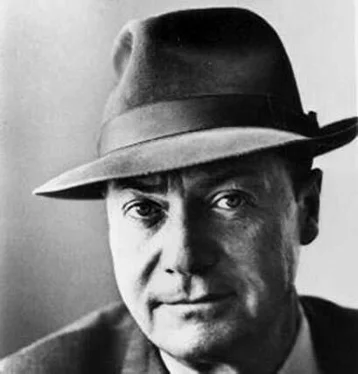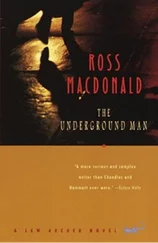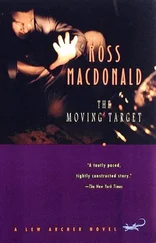So he began to swing like a gymnast between two emotional spheres: the glamorous-seeming world of aggressive action and the sere oasis of spiritual humility. And, perhaps, between his father and his mother.
One family member must have instilled in Lew an early love of stories, for later in life Archer told so many stories so well. A striking characteristic of those tales is their frequent descriptions of people through animal imagery (“He looked at her sideways, swinging his head like a bull.” “She turned on him like a hissing cat.”). Might it be that some relative had the habit of sitting Lew down and making up fables for him in the oral tradition, cloaking real-life people in the guise of animals?
At the same time, the boy’s eyes must have been opened to an awareness of the entire natural world – so alive was he, in every story he helped create, to the trees and plants and birds Southern California displayed in lush profusion. Included in that awareness were the less-beautiful predators – especially rats, of which there must have been no scarcity in the waterfront-adjacent Long Beach neighborhood where Archer grew up. A rat scurries briefly through almost every Lew Archer book, sharp-toothed symbol of a spoiled paradise.
The then-silent movies were a great source of entertainment for Lew as a child. Along with most boys of six, seven, or eight, he loved cowboy pictures at the Saturday-afternoon matinees featuring such heroes as Fred Thompson and Tom Mix; but his favorite serials were the adventures of an English police detective, Inspector Fate of Limehouse, [10] Principal Pictures, 1924.
played by the now-forgotten American actor Raymond Campbell.
Certainly Lew learned to read at an early age. The avid reading of books was a habit Archer continued until he died. It makes sense to assume one of the first “grown-up” volumes he tackled was namesake Lew Wallace’s Ben-Hur , a landmark bestseller that combined theological concerns with high adventure – and which was also, not incidentally, an account of a man falsely accused of plotting murder.
Reading for pleasure was one thing; doing well in school, quite another. There’s no indication that young Lew Archer, much engaged in such physical pursuits as football and track and fishing, was an especially good student. He was intimidated by female teachers, for one thing: “tall women behind desks,” like the vice-principal of Wilson Junior High, “who disapproved of the live bait I used to carry in the thermos bottle in my lunch pail, and other ingenious devices.” [11] Ross Macdonald, The Doomsters (Knopf, 1958).
And there were other distractions – such as the enchanting girl he used to follow home from junior high. (“I never did work up enough nerve to ask her for the privilege of carrying her books.” [12] Ross Macdonald, The Chill (Knopf, 1964).
)
By the time he reached high school, such distractions had proliferated, even as they stretched farther out of reach: beautiful rich girls in soft wool coats buttoned up to their soft chins, “the girls with oil or gold or free-flowing real-estate money dissolved in their blood like blueing.” [13] The Drowning Pool.
If such girls noticed Lew Archer at all, it was as an object of condescension. Long after leaving Long Beach, he’d recall, he was plagued by a realistic recurring dream:
I was back in high school, in my senior year. The girl at the next desk smiled at me snootily.
“Poor Lew. You’ll fail the exams.”
I had to admit…this was likely. The finals loomed…like the…slopes of purgatory, guarded by men with books I hadn’t read.
“I’m going to college,” she said. “What are you going to do?”
I had no idea…back in Mr. Merritt’s classroom, dreading the finals and wondering what I would do when I had failed them.
“You’ll have to learn a trade,” the snooty one said. [14] Ross Macdonald, The Zebra-Striped Hearse (Knopf, 1962).
There were worse fates chasing Lew Archer through adolescence than the prospect of flunking high school. “The teens were my worst time,” he later judged. [15] Ross Macdonald, The Far Side of the Dollar (Knopf, 1965).
An irreconcilable rift grew between Lew and the possibly abusive adults closest to him. One day, he remembered decades later (in one of only three printed references ever made to his male parent), with anger stinging his eyes and clenching his fists, “I took the strap away from my father.” [16] The Doomsters.
After that, it seems, Lew was on his own – free to cruise the boulevards of Long Beach all night in a model-A Ford “hot-roadster,” to hang around drive-ins, where the air was thick with “the blended odors of gasoline fumes and frying grease”; [17] The Doomsters.
to find a “rough and forlorn” excitement in the company of other hot-rodders, the sound of whose cars (“whining, threatening, rising, fading”) “spoke to something deep in my mind which I loved and hated.” And he roamed beyond Long Beach, sharing “joy-rides and brawls with the lost gangs in the endless stucco maze of Los Angeles.” [18] Ross Macdonald, Find a Victim (Knopf, 1954).
He learned dubious skills: how to force a Yale lock, how to break into an automobile, how to hot-wire a car’s ignition. A working-class boy at the height of the Depression, an alienated son full of righteous anger, Lew was headed down a bad road. He stole goods, money, and cars. He was, in his own later assessment, “a street boy…gang-fighter, thief, poolroom lawyer…I was a frightened junior-grade hood in Long Beach, kicking the world in the shins because it wouldn’t dance for me.” [19] The Doomsters.
Luckily, he was apprehended.
As he revealed in a 1958 work:
[A] whisky-smelling plain-clothes man caught me stealing a battery from the back room of a Sears Roebuck store in Long Beach. He stood me up against the wall and told me what it meant and where it led. He didn’t turn me in.
I hated him for years, and never stole again.
But I remembered how it felt to be a thief. It felt like living in a room without any windows. Then it felt like living in a room without any walls. It felt as cold as death around the heart, and after a while the heart would die and there would be no more hope, just the fury in the head and the fear in the bowels… But for the grace of an alcoholic detective sergeant, me. [20] Find a Victim.
Scared out of a life of crime, Archer still had to make a living. And he had to figure out things mostly on his own, for “people started dying” on him – maybe one or both parents, no doubt his grandmother, possibly his uncle Jake. After high school, he took a seasonal job to buy some time and sort out his thoughts; and he found that being a self-sufficient adult might have consolations:
“When I was seventeen I spent a summer working on a dude ranch in the foothills of the Sierra. Toward the end of August, when the air was beginning to sharpen, I found a girl, and before the summer was over we met in the woods. Everything since,” he concluded in the 1960s, “[has] been slightly anticlimactic.” [21] The Far Side of the Dollar.
Back in Long Beach, Lew confronted his options. A big earthquake hit his home town in 1933, when Lew was about eighteen. Maybe it jolted him into college – and right back out of it; Archer’s attempt at higher education “hadn’t worked out.” [22] The Chill.
It’s possible he boxed in some Golden Gloves matches, but professional prizefighting was not for him.
Perhaps blows gotten in the ring, though, jarred loose memories of Inspector Fate of Limehouse, the English copper whose silent-film adventures meant so much to an eight-year-old Lew and who now, oddly or not, came to mind as an inspiration. Might Inspector Fate have merged in Lew’s imagination with the alcoholic Long Beach cop who’d rescued him from a life of crime?
Читать дальше












